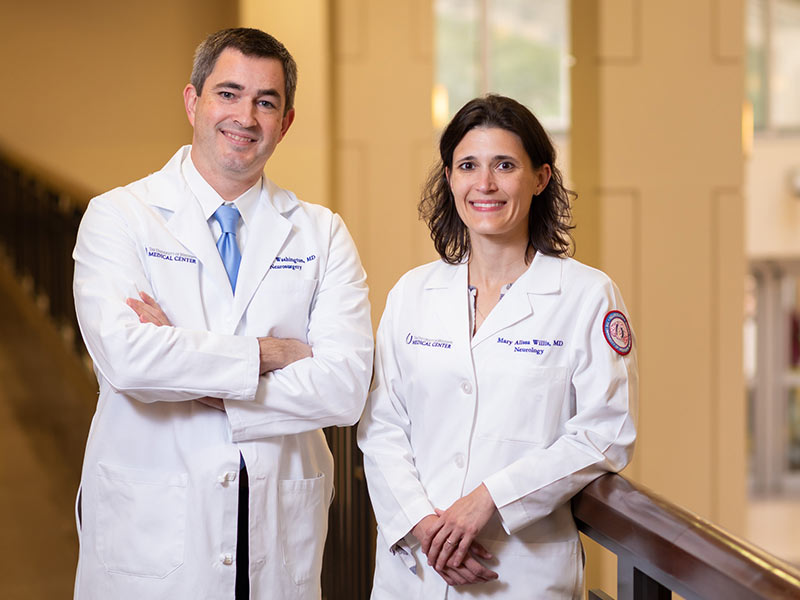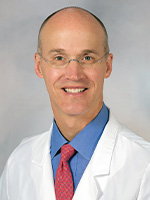In a tale of two departments, former classmates reunite as chairs

GLOSSARY
- Aneurysm – a weakening of an artery wall that causes it to bulge or balloon
- Awake craniotomy - a procedure for treating some neurological conditions, such as brain tumors or epileptic seizures; it’s performed while the patient is kept awake and alert in order to answer relevant questions from the surgeon, ensuring that he or she treats the area needing surgery
- Deep brain stimulation – stimulation of the brain achieved by implanted electrodes that produce electrical impulses that control abnormal ones; it’s used to treat such conditions as epilepsy and Parkinson’s disease
- Epilepsy – abnormal brain activity causing seizures or episodes of unusual behavior, sensations, even loss of awareness
- Multiple sclerosis – a disease that attacks the never fibers’ protective cover, disrupting communication between the brain and the rest of the body; it can result in permanent, disabling damage to the nerves
- Neurology – a medical specialty whose experts on disorders of the nerves and nervous system offer diagnoses and care for patients with epilepsy, dementia, multiple sclerosis and other conditions
- Neurosurgery – surgery of the nervous system, including the brain, spinal cord, spinal column and more
- Parkinson’s disease – an incurable but treatable nervous system disorder that affects movement and speech
- Stroke – a lack of oxygen and nutrients to the brain when the blood supply to it is slowed or stopped
Dr. Chad Washington and Dr. Alissa Willis saw their “first patient” together over a period of several months in 2003.
They were first-year medical students at the University of Mississippi Medical Center, before the letters “M.D.” were attached to their names and before they were detached from each other, diverging on paths toward separate careers; their “patient” was a body donor in the Gross Anatomy Lab.
Now, 16 years later, their stories intersect again, at the same place, UMMC; and by patients shared.
Washington, associate professor and chair of the Department of Neurosurgery; and Willis, associate professor and chair of the Department of Neurology, practice similar-sounding specialties dedicated to the broader cause of neuroscience: treating all diseases of the nervous system.
“Ultimately, neuroscience is a team sport,” said Willis, whose Gross Anatomy Lab partners in 2003 included Dr. Kristin Weaver, now a UMMC assistant professor of neurosurgery and pediatric neurosurgeon.
In 2007, Willis and Washington graduated together from the School of Medicine; today, they are partners of a different sort.
“I’m happy to be back at UMMC working with him again,” said Willis, who became chair on September 1 after leaving the Mellen Center for Multiple Sclerosis at the Cleveland Clinic in Ohio.
Their partnership is part of the collaborative Neuro Institute, whose ingredients include their respective departments.

“What’s unique about UMMC is the chairs get along with each other very well. There is a spirit of unity and cohesion,” said Dr. Scott Rodgers, professor and chair of psychiatry and human behavior, as well as the chair of the Neuro Institute.
In such a professional atmosphere, “we can achieve much more for our patients,” Rodgers said.
These are patients with Alzheimer’s disease, Parkinson’s disease, stroke, migraine, epilepsy, multiple sclerosis and more. About one in six people has some kind of neurological disorder, Willis said, citing a 2007 World Health Organization report.
Meeting this challenge actually is brain surgery, at least for Washington. It’s also spine surgery; procedures to treat epilepsy, as well as aneurysms; surgery for blood vessels in the neck and brain; deep brain stimulation for, among other conditions, Parkinson’s disease; and more.
Neurosurgeons at UMMC are known for taking care of injured police officers, fire fighters and other first responders, said Washington, who took over as chair of neurosurgery in July. This is a hallmark of a department with seven faculty members and 11 residents, and a goal of recruiting two or three more faculty positions soon.
The department is small, but “its input is large,” said Washington, also the medical director of the UMMC Stroke Program.
“From pediatric patients to cancer to stroke, there are few service lines we don’t engage with,” said Washington, who joined the faculty in 2015 after completing his residency at Washington University in St. Louis.
When asked to name ways neurosurgeons and neurologists harmonize, Washington reeled off these and other examples:
- UMMC has four board-certified neuro-intensivists, physicians with fellowship training in neurological intensive care. They work in a dedicated 20-bed unit with neuro-trauma surgeons, neurologists and other specialists. From the Department of Neurology, and in tandem with neurosurgeons, Dr. Hana Nobleza, assistant professor of neurology and the rest of her team take care of “some of the sickest patients in the hospital and the state.”
- A vascular neurology team treats ischemic stroke – the type usually caused by a blood clot blocking a brain blood vessel. Joining forces with the neurology team and others, neurosurgeons remove the clots.
- Neurosurgeons and the neurology team cooperate to treat epilepsy.
- In collaboration with the Cancer Center and Research Institute, fellowship-trained neuro-oncologists Dr. Mark Anderson, associate professor of neurology, and Dr. Nawal Shaikh, assistant professor of neurology, unite with the Department of Neurosurgery to manage brain tumors.
To oversimplify the contact between Willis’ and Washington’s departments: Neurologists usually see shared patients first, possibly in the emergency room, determining a diagnosis of, say, a brain tumor, or a stroke; they may then send the patients who are candidates for a procedure to a neurosurgeon.
“Elsewhere, neurosurgeons and neurologists may do some of the same procedures and deliver some of the same services we do here,” Washington said, “but the subspecialties and critical care procedures at UMMC, such as awake craniotomies, are things you can’t get anywhere else in the state.
“The combination of these teams provides the state with something unique and very special.”
This singularity includes the state’s only Neurocritical Care Unit and the largest neuro-oncology program in the state, Willis said.
“The [neurology] department has a core of not only excellent clinicians, but also very seasoned researchers and educators.”
As its leader, Willis is the heir to a sequence of distinguished chairs: Dr. Robert Currier, Dr. James Corbett, Dr. Alexander Auchus and interim chair Dr. Scott Stringer, professor and chair of the Department of Otolaryngology and Communicative Sciences.
“I’m proud to be back as a member of the department,” Willis said.
Her department is stocked with a multiple sclerosis clinic that should benefit from Willis’ expertise: In Ohio, the Jackson native participated in clinical trials at the Mellen Center, the largest MS center in the nation. As a medical student, she was profoundly influenced by Dr. Robert Herndon, professor of neurology, and a pioneer in MS care.
“Neurology appealed to me as an engineer,” said Willis, who earned a chemical engineering degree from Mississippi State University. Like engineers, neurologists define and analyze problems, then identify a solution.
“With multiple sclerosis, each case is unpredictable,” Willis said. “You could have 20 different patients with the same diagnosis, but each one may look different and respond differently to the same treatment.
“Neurology offered an unending promise of continued learning, and I haven’t been let down so far.”
She also wants to ensure patients aren’t let down. Willis’ return to her home state and city was “an opportunity to narrow the gap and make a difference in Mississippi,” she said. That gap is represented by this ratio: one neurologist for every 32,843 Mississippians. The share of neurosurgeons is paltrier: one for every 56,391 residents.
“There are large swaths of the state where there is very limited access to neurological care,” said Willis, whose department is staffed with 18 neurologists, 16 nurse practitioners, along with 16 residents.
Among her plans or goals is to furnish remote care – teleneurology – for patients with, say, epilepsy or stroke.
She would like to see more neurology residents train at UMMC. “To better treat the population needing care and grow the neurology workforce in the state, we need to increase the numbers of neurologists we train and improve neurology for all of our medical students,” she said.
As one of those neurosurgeons, Washington has inherited a department with a muscular framework he attributes to his predecessors: Dr. Orlando Andy, Dr. Robert R. Smith, Dr. Andrew Parent and Dr. H. Louis Harkey III.
“Dr. Harkey continued with this idea of subspecialty care, the idea that the state’s only academic neurosurgery department should offer a level of expertise that departments elsewhere couldn’t provide,” he said.
A native of Pontotoc, located some 180 miles from Jackson, Washington, like Willis, calls Mississippi “home.” “I feel a debt of gratitude to the state and this institution,” he said.
“I always wanted to come back. It’s a good feeling to know that you’re treating your friends and family.”
Never was that feeling stronger than on one of his on-call days when was summoned to the emergency room to treat a patient transported from north Mississippi.
“By the time I get to the ER, I have 25 messages on my phone,” Washington said. “They were from family and friends who had realized that I was going to take care of someone from my hometown.
“I don’t think many other neurosurgeons have personal experiences like that.”


